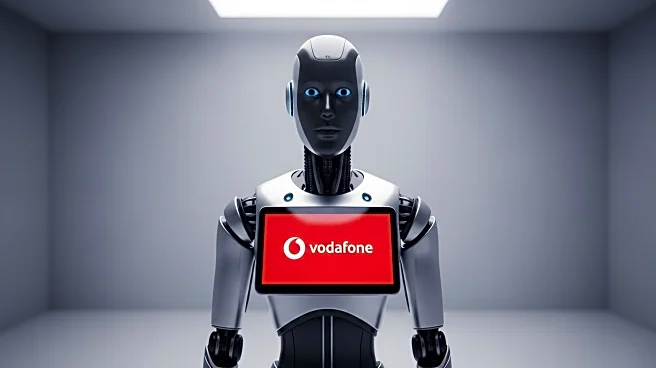What is the story about?
What's Happening?
Vodafone, a leading British telecommunications company, has launched an AI-generated spokesperson as part of its digital marketing strategy. This virtual representative, depicted as a German-speaking woman in a red hoodie, is featured in TikTok videos promoting high-speed home internet services. These videos have amassed over 2 million views, indicating significant public interest in AI-driven consumer engagement. The campaign extends to other platforms like X, where the AI spokesperson is further promoted. Vodafone has stated that this initiative is part of an experimental approach to explore various promotional methods, reflecting the growing integration of AI in everyday life. However, the use of AI in advertising has sparked discussions about potential ethical concerns, particularly in light of past controversies involving AI technologies.
Why It's Important?
The introduction of AI spokespeople in advertising represents a significant shift in marketing strategies, with potential implications for consumer engagement and brand perception. As AI becomes more prevalent, companies like Vodafone are exploring its capabilities to enhance promotional efforts. However, this trend raises ethical questions about transparency and accountability. Experts emphasize the importance of disclosing AI usage to consumers and ensuring that AI-generated content aligns with brand values. The potential for misuse, such as deepfakes or impersonation, necessitates careful management to maintain consumer trust. This development could influence how businesses approach marketing, potentially leading to broader adoption of AI technologies across industries.
What's Next?
As Vodafone continues to test AI in its advertising, the company and others in the industry may need to address public concerns about AI ethics and transparency. Implementing verification processes and responsible AI usage guidelines could become standard practice to mitigate risks. Open communication with consumers about data protection and brand identity safeguarding will be crucial. The success and reception of Vodafone's campaign may influence other companies to adopt similar strategies, potentially leading to a wider acceptance of AI in marketing. However, ongoing scrutiny and debate over ethical implications are likely to persist, shaping the future of AI-driven advertising.
Beyond the Headlines
The use of AI in advertising not only challenges traditional marketing practices but also raises broader questions about the role of technology in shaping consumer perceptions. As AI-generated content becomes more sophisticated, distinguishing between human and virtual interactions may become increasingly difficult, potentially altering consumer expectations and experiences. This shift could lead to new regulatory considerations and ethical standards in the advertising industry, as stakeholders navigate the balance between innovation and consumer protection.















